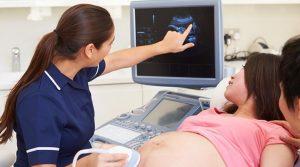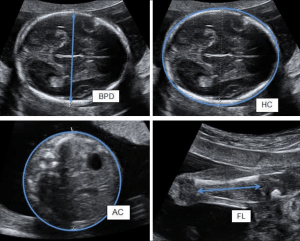HOW DO SONOGRAPHERS DETERMINE MY BABY’S WEIGHT AND IS IT ACCURATE?
Congratulations on the growing life inside your tummy! Throughout your pregnancy, you will have numerous ultrasound to check up on your baby. These ultrasounds are a wonderful experience for parents to see their baby but also the reassurance that baby is growing and developing well.[1] Here, we discuss how sonographers determine your baby’s weight through ultrasound.
What is an ultrasound?
Many parents know that ultrasounds consist of the sonographer applying gel to the mother’s belly and moving a hand held device around to have a look at the baby.[2] (Figure 1) But let’s have a look at the technical side of ultrasounds. Ultrasound scan uses high frequency sound waves to create real time images of your baby inside your womb.[3] These sound waves travels through soft tissues and fluids within the womb and bounces/echoes off the surface.[3] The image of your baby is then created and shown on a screen for you to see.

So, how is the baby’s weight measured through ultrasound?
During your medical ultrasounds, your sonographer or specialist will determine the baby’s weight in the womb. There are different algorithms that can be used by your specialist to estimate your baby’s weight. The most commonly used algorithms are; Biparietal Diameter (BPD), Head Circumference (HC), Abdominal Circumference (AC) and the Femur Length (FL).[4] (Figure 2) The combination of the measurements mentioned above will be used in a formula to calculate the baby’s weight and size.[4] But what do these measurements mean? Keep on reading!
Biparietal Diameter: This is also known as the distance between the sides of the baby’s head.[5] Different babies that weigh the same can also have different head sizes.[6]
Head Circumference: This algorithm measures the circumference of the baby’s head.[7]
Abdominal Circumference: This measures the circumference of the fetal abdomen.[4] To measure the circumference, your specialist will measure the distance between the pubic bone and the top of your belly with a measuring tape.[7]
Femur Length: This is measured by the length of the longest bone within the body, the femur which is also known as the thigh bone.[5]

How accurate are the measurements?
It is important to understand that there can be errors in the estimation of the baby’s weight. According to Grove (2017), research has shown that there may be a 15% error in determining weight.[8] However, during the first half of your pregnancy, the general estimation of the baby’s weight will be more accurate as the baby is smaller and easier to measure.[5] Inversely, the closer you are to your due date, the unreliable the measurements will be.[5]
Will the estimated ultrasound weight be the same as the birth weight?
According to research and studies, overall the estimated baby weight from ultrasounds tend to be greater than the birth weight.[9] One reason for this is the retention of amniotic fluid in the womb.[10] When your baby is born, the fluid is loss within the first few days of being in the world, hence the difference in the estimated ultrasound weight and birth weight.[10] However, the loss of weight is nothing to be concerned about as this is normal after birth and the weight is slowly gained back each day.[10]
When can I find out my baby’s weight?
During your 20-22 week ultrasound (also known as the Morphology Ultrasound), your sonographer/specialist will be able to give you an estimate of how much your baby weighs.[11] Therefore, it is strongly recommended that you to attend this milestone scan as this checks for both your baby’s growth as well as a detailed assessment for any abnormalities.[11] Also, this allows you to have time to bond with your little growing baby!
If you enjoy this article and would like to know more about amniotic fluids, how a baby’s weight is determined by ultrasound, ectopic pregnancy and everything else, please click here.
Disclaimer
This is a professional opinion and is based on the latest credible research. This is for general educational purposes only, so please seek professional medical advice from your personal practitioner.
References
[1] https://blog.svphm.org.au/ultrasound-in-pregnancy/
[2] https://www.pregnancybirthbaby.org.au/ultrasound-scan
[3] https://www.medicalnewstoday.com/articles/245491#uses
[4] http://brochures.mater.org.au/brochures/mater-mothers-hospital/ultrasound-scan-fetal-growth-scan
[5] https://www.bellybelly.com.au/pregnancy/accurate-ultrasound-weight/
[6] https://www.babymed.com/fetal-and-obstetric-ultrasound-measurements-pregnancy
[7] https://www.babymed.com/pregnancy-ultrasound/estimating-fetal-weight-ultrasound
[8] https://awomanshealingcenter.com/accuracy-ultrasound-birth-weights/
[9] https://obgyn.onlinelibrary.wiley.com/doi/abs/10.1111/aogs.13645
[10] https://kidshealth.org/en/parents/grownewborn.html
[11] https://www.mydr.com.au/tests-investigations/ultrasound
[12] https://www.cdc.gov/ncbddd/birthdefects/diagnosis.html
[13] https://www.nps.org.au/news/ultrasound-during-pregnancy




